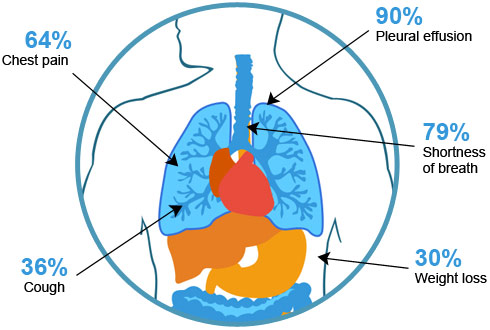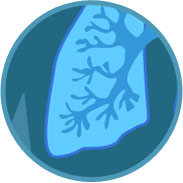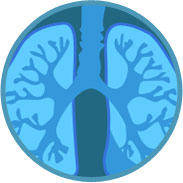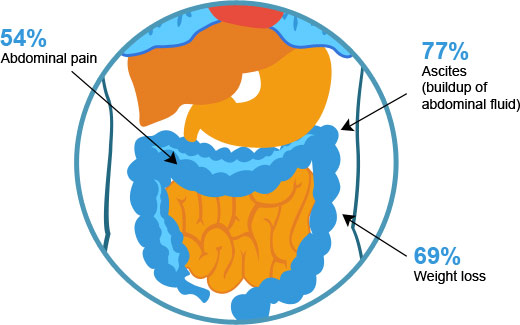Mesothelioma Symptoms
The following symptomatic responses MAY BE caused by mesothelioma, or by other less serious medical problems. Early symptoms of the cancer are often similar to pneumonia. This information is provided for your information only, and should NOT take the place of a full medical diagnosis.
If you are experiencing any of the below symptoms, consult your doctor right away. Early detection and diagnosis improves survival chances.
Symptoms of Pleural Mesothelioma
A 2009 report by the Texas Occupational Medicine Institute looked at 238 cases. Researchers found the most common symptoms in pleural patients were:

According to the Mesothelioma Applied Research Foundation, studies reported by Dr. Philippe Aram Chahinian, reported that up to 30% of the patients experienced a fever. He also reported that 3% of the patients reported no symptoms.

Pleural Effusion
A pleural effusion is an accumulation of fluid between the lining of the lung and the chest cavity. It is one of most common symptoms of asbestos related-cancers and directly leads to shortness of breath (“dyspnea”). Dyspnea increases in relation to the volume of fluid, as does the pain associated with the effusion.

Dyspnea
Dyspnea can be caused by a pleural effusion and/or by the presence of a tumor(s) in the pleura. As both conditions restrict the proper functioning of the lungs, shortness of breath is a typical symptom.

Chest / Back Pain
A buildup of fluid in the pleural lining of the lungs can create pain 60% of the time. Only 5% of patients have mesothelioma in both lungs.

Chronic Hoarseness / Difficulty Swallowing / Coughing up Blood
Chronic hoarseness, difficulty swallowing (dysphagia) and/or the coughing up of blood (hemoptysis) are also symptoms, but are considered more rare than the symptoms noted above as these exhibit in less than 1% of undiagnosed patients.

Swelling of the Face and Arms
The swelling of the face or neck areas can indicate a spreading of the cancer beyond the mesothelium.
Other Symptoms
Other reported symptoms include fever, muscle weakness, sensory loss, and nausea.
Symptoms of Peritoneal Mesothelioma
Peritoneal patients presented with the following primary symptoms:


Pain or Swelling of the Abdomen
Symptoms of peritoneal mesothelioma usually include abdominal pain and swelling due to a buildup of fluid in the abdomen (ascites).

Bowel Obstruction
A tumor in the peritoneum membranes can exert increasing pressure on the organs in the abdomen, leading to bowel obstruction and distention.

Weight Loss / Anemia
Abdominal pain, bowel obstruction, and the pressure exerted by the presence of a tumor(s) can lead to a loss of appetite, nausea, weight loss, anemia, and other ‘wasting symptoms’.
Other Symptoms
The presence of cancer and tumors in the peritoneal tissues of the abdomen can also cause a frequency in urination, night sweats, fever, and loss of muscle tissue.
The varied and non-specific symptoms associated with the disease can delay detection and diagnosis. If you or a loved one are experiencing any of the above symptoms, consult your doctor right away. Make sure that your physician is aware of any known asbestos exposures and of any other occupational risk factors. To see a list of at-risk occupations, please follow this link: occupational hazards and at-risk occupations.
The early detection of the cancer is critical to the patient’s prognosis and in determining applicable treatment options. However, it can be difficult to diagnose for a number of reasons, so a variety of tests may be used to determine a diagnosis. To learn more about how this cancer is diagnosed, please follow this link: diagnosis.
Other relevant links: Life Expectancy


